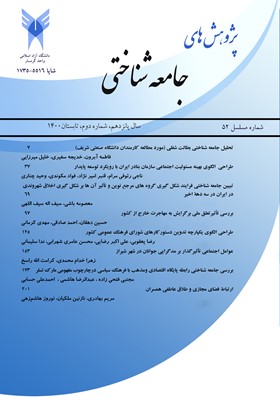تبیین جامعه شناختی فرایند شکل گیری گروه های مرجع نوین و تاثیر آن ها بر شکل گیری اخلاق شهروندی در ایران در سه دهة اخیر
محورهای موضوعی : در این فصلنامه موضوعات جامعه شناختی در اولویت چاپ هستند و موضوعات نزدیک به جامعه شناسی در اولویتهای بعد قرار می گیرندمعصومه باشی 1 , سیف اله سیف اللهی 2 *
1 - دکتری جامعه شناسی گروه های اجتماعی، دانشکده علوم اجتماعی، واحد تهران مرکزی، دانشگاه آزاد اسلامی، تهران، ایران.
2 - دانشیار گروه جامعه شناسی، دانشکده علوم انسانی، واحد علوم و تحقیقات، دانشگاه آزاد اسلامی، تهران، ایران.
کلید واژه:
چکیده مقاله :
امروزة با تشدید فرایند مدرنیته و پسامدرنیته، تولید و رشد تکنولوژی های گوناگون و در پی آن تغییرات فزاینده در حوزه های گوناگون اجتماعی، اقتصادی، فرهنگی و...به وجود آمده است. در این میان گروه های مرجع تاثیرگذار در امر اخلاق شهروندی نیز دستخوش تغییرات مهمی از جمله تغییر در الگوها، روش- ها و ارزش های خود شده اند. تحقیق حاضر نیز با توجه به این مسئله ی مهم و با هدف تبیین جامعه شناختی فرایند شکل گیری گروه های مرجع نوین و تاثیر آن ها بر شکل گیری اخلاق شهروندی در ایران در سه دهة اخیر به روش کیفی در سال تحصیلی 99-98 به اجرا درآمد.چارچوب نظری تحقیق با تلفیق نظریه های دورکیم، پارسونز، هابرماس، گیدنز، والرشتاین، مرتون و رویکرد سیف اللهی شکل گرفت. از نمونه گیری هدفمند استفاده شد و داده ها با تکنیک مصاحبه و با استفاده از پرسشنامه نیمه ساخت یافته جمع آوری شد. جامعه مورد مطالعه استادان دو دانشکده علوم اجتماعی دانشگاه آزاد تهران مرکز و علوم و تحقیقات بودند. حجم نمونه تا اشباع داده ها مصاحبه با (21 نفر) بود.بر اساس یافته ها شهروندی در ایران به معنای واقعی آن شکل نگرفته و وضعیت اخلاق شهروندی در ایران ضعیف ارزیابی شد. همچنین عوامل درون جامعه -ای، عوامل برون جامعه ای، فضای مجازی و رسانه های جمعی بر شکل گیری گروه های مرجع نوین در سه دهه اخیر ایران تاثیرگذار بوده اند. گروه های مرجع نوین نیز طی سه دهة گذشته بر روند شکل گیری اخلاق شهروندی در ایران موثر بوده اند.
Masoumeh Bashi PhD in Sociology of Social Groups, Faculty of Social Sciences, Central Tehran Branch, Islamic Azad University, Tehran, Iran. Seifullah Seifullahi Associate Professor, Department of Sociology, Faculty of Humanities, Science and Research Branch, Islamic Azad University, Tehran, Iran. (Responding Author): rped_almizan@yahoo.com Today, with the intensification of the process of modernity and postmodernity, the production and growth of various technologies, followed by increasing changes in various areas of social, economic, cultural and .... Meanwhile, influential reference groups in the field of citizenship ethics have undergone important changes, including changes in their patterns, methods and values. The present study, with regard to this important issue and with the aim of "sociological explanation of the process of formation of new reference groups and their impact on the formation of citizenship ethics in Iran in the last three decades" in a qualitative way in the academic year 99-98 was implemented. The theoretical framework of the research was formed by combining the theories of "Durkheim, Parsons, Habermas, Giddens, Wallerstein, Merton and Saifullah's approach". Purposeful sampling was used and data were collected by interview technique and a semi-structured questionnaire. The study population was the professors of the two faculties of social sciences of Tehran Azad University and the center of science and research. The sample size was up to data saturation interview (21 people). Based on the findings, citizenship in Iran in the true sense was not formed and the situation of citizenship ethics in Iran was assessed as weak. Also, factors within the community, external factors, cyberspace and mass media have influenced the formation of new reference groups in the last three decades in Iran. New reference groups have also been influential in the formation of citizenship ethics in Iran over the past three decades.
_||_

